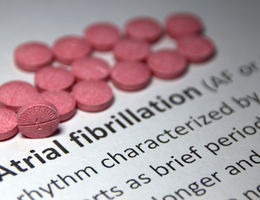We’re Stronger Together
With your help, we can make ambitious innovations in clinical care and education for our community.
A heart arrhythmia is a condition where your heartbeat is either too fast (tachycardia), too slow (bradycardia) or irregular. Because arrhythmias range from harmless to deadly, it’s critical you receive expert diagnosis and care from experienced physicians.
Our team consists of experts in cardiac electrophysiology, the study of heart electrical activity (which controls the heartbeat). If you’re suffering from any type of arrhythmia, we’re here to help you reclaim a better quality of life.
Take the next step: If you’re experiencing unusual symptoms, talk to your primary care physician or cardiologist right away.
Our team treats all types of arrhythmia (irregular heartbeat), including:
If you need heart arrhythmia care or evaluation, your cardiologist or primary care physician will refer you to our team. They’ll schedule an appointment with our office to start procedures that can diagnose or treat your condition.
Our team consists of electrophysiologists (heart rhythm doctors), technicians and nurses devoted to providing compassionate, excellent care. You’ll find us in the Schuman Pavilion on the medical center campus.
When you arrive, you may already have a diagnosis or you may need more detailed diagnostic procedures. These procedures help guide diagnosis and treatment by providing detailed information about your condition. You may need procedures to:
After any tests, your care team will make sure you fully understand your condition and what treatment may involve.
Before we start treatment, we’ll sit down with you in a consultation to discuss your treatment options in detail. We’ll review procedures, what they involve, how long they take and the potential benefits and risks.
Various treatment options are available for arrhythmias, and our team is experienced in each. Depending on your condition, treatment may involve options like medications, implantable devices or minimally-invasive procedures (less damaging procedures with easier recovery).
Your procedure will usually take place about one week after your first appointment with us. We’ll let you know if you need to follow any special instructions to prepare for the procedure. Preparation might include avoiding food and beverages the night before or pausing certain medications.
Most patients are able to go home the same day or the day after their procedure. You may need to stay for two or more days, depending on the procedure and your unique needs.
We’ll give you a call two days after your procedure to see how your recovery is going. Most patients find immediate, significant relief after just one procedure, and follow-up appointments help make sure relief is long-lasting.
Within the next month (or sooner for implant procedures), you’ll need to come back in for a follow-up appointment. Because monitoring and managing arrhythmia is critical to heart health, regular follow-up appointments may be needed every six months. The time between your follow-ups may vary depending on your condition.
Arrhythmias can change over time, as can your heart health. We’ll continue to monitor and adjust your care plan and implanted devices. If you need additional procedures in the future (including lead extraction), you can feel confident your heart is in the right hands.
If you’re experiencing unusual heart rhythm, pain, palpitations, dizziness or weakness, talk to your primary care physician or cardiologist right away. While many arrhythmias are harmless, some may become worse over time and others are life-threatening.


Take the next step: If you’re experiencing unusual symptoms, talk to your primary care physician or cardiologist right away.
Our team treats all types of arrhythmia (irregular heartbeat), including:
If you need heart arrhythmia care or evaluation, your cardiologist or primary care physician will refer you to our team. They’ll schedule an appointment with our office to start procedures that can diagnose or treat your condition.
Our team consists of electrophysiologists (heart rhythm doctors), technicians and nurses devoted to providing compassionate, excellent care. You’ll find us in the Schuman Pavilion on the medical center campus.
When you arrive, you may already have a diagnosis or you may need more detailed diagnostic procedures. These procedures help guide diagnosis and treatment by providing detailed information about your condition. You may need procedures to:
After any tests, your care team will make sure you fully understand your condition and what treatment may involve.
Before we start treatment, we’ll sit down with you in a consultation to discuss your treatment options in detail. We’ll review procedures, what they involve, how long they take and the potential benefits and risks.
Various treatment options are available for arrhythmias, and our team is experienced in each. Depending on your condition, treatment may involve options like medications, implantable devices or minimally-invasive procedures (less damaging procedures with easier recovery).
Your procedure will usually take place about one week after your first appointment with us. We’ll let you know if you need to follow any special instructions to prepare for the procedure. Preparation might include avoiding food and beverages the night before or pausing certain medications.
Most patients are able to go home the same day or the day after their procedure. You may need to stay for two or more days, depending on the procedure and your unique needs.
We’ll give you a call two days after your procedure to see how your recovery is going. Most patients find immediate, significant relief after just one procedure, and follow-up appointments help make sure relief is long-lasting.
Within the next month (or sooner for implant procedures), you’ll need to come back in for a follow-up appointment. Because monitoring and managing arrhythmia is critical to heart health, regular follow-up appointments may be needed every six months. The time between your follow-ups may vary depending on your condition.
Arrhythmias can change over time, as can your heart health. We’ll continue to monitor and adjust your care plan and implanted devices. If you need additional procedures in the future (including lead extraction), you can feel confident your heart is in the right hands.
If you’re experiencing unusual heart rhythm, pain, palpitations, dizziness or weakness, talk to your primary care physician or cardiologist right away. While many arrhythmias are harmless, some may become worse over time and others are life-threatening.


With your help, we can make ambitious innovations in clinical care and education for our community.